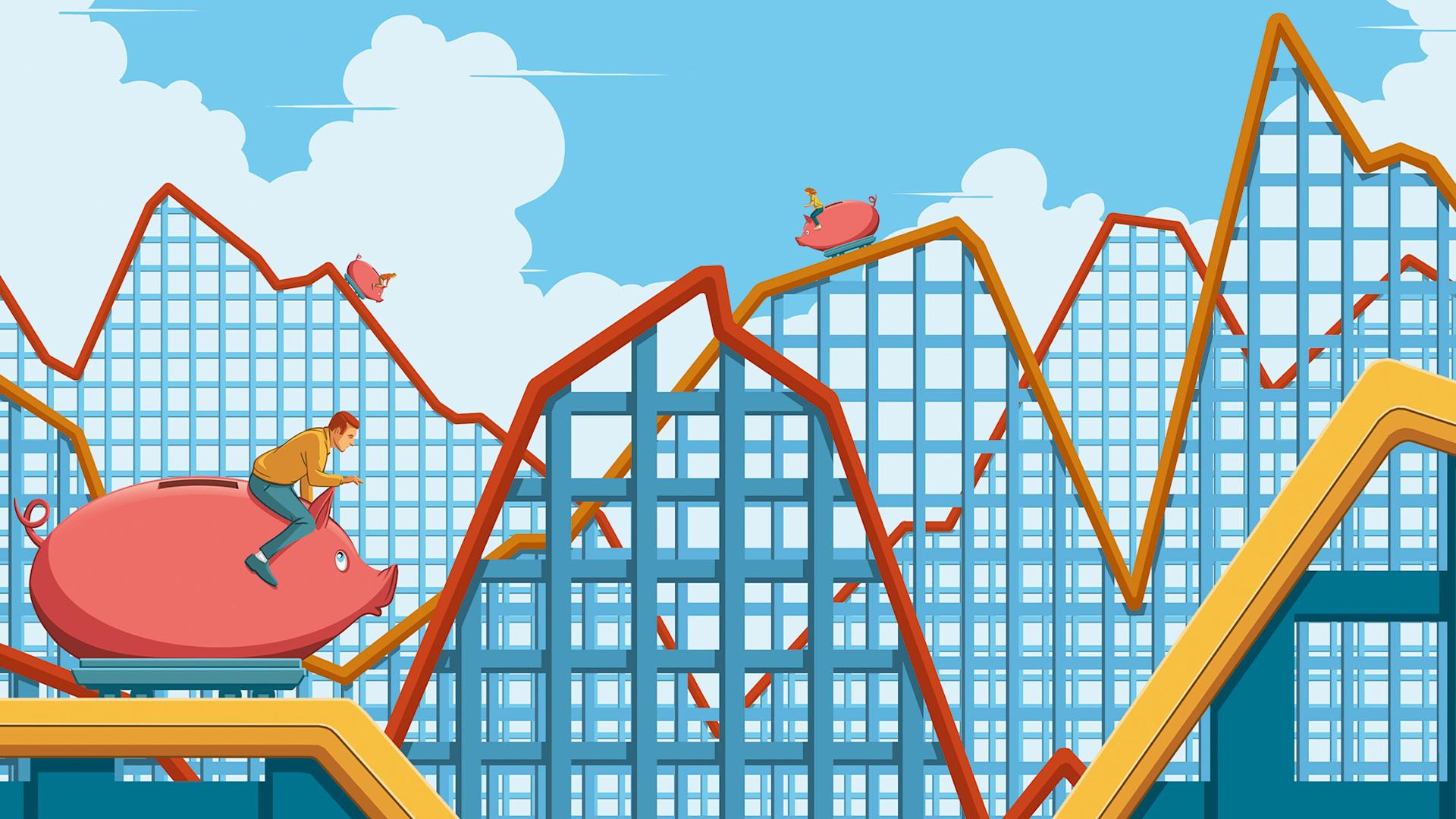
Migros Bank
How to do more with your money
Four tips to help you grow your assets steadily and reliably.
navigation

Bonds shares, funds and the like
You don't need to be a millionaire to invest in stocks and shares. But there are a few things you should know. An overview for novices.
Fundamentally even small amounts can prove worthwhile over time. For example, if you were to invest CHF 50 each month, in ten years – at an average return of 8 percent – you would have built up savings of CHF 9,068.59. By comparison, if you put the money into a savings account earning 0.7 percent (the rate currently offered by Migros Bank) it would grow to CHF 6,216.06.
Over the long term, investing in the stock market offers the prospect of much better returns than a savings account. Such an account will currently earn interest in the range of 0.25 to 1 percent. At best, that will merely take the edge off the fact that your money isn't going as far due to inflation.
These mean you own a share of a company. Companies issue shares to raise equity, for instance to finance investments. As a shareholder, you are co-proprietor of a company. Shares are traded on stock exchanges and other public trading platforms. Their price is determined by supply and demand. If a company's market value rises, so does the value of your shares. If the opposite happens, they fall in value.
Investment funds pool investors' wealth and invest it in shares in multiple companies. The advantage here is that if the price of certain shares slumps, the loss is cushioned by others in the basket. Fund managers apply various criteria when putting together funds. They may for instance focus on sustainable businesses. ETFs (exchange traded funds) are a special form. They often reflect specific stock market indices (e.g. MSCI World).
These are securities that have a fixed term and earn a constant rate of interest. They are also referred to as debentures. Businesses use bonds to raise outside capital. But unlike shares, you don't become a co-proprietor. Bonds are also traded on the stock market. In other words, you can sell them before they are repaid by the issuing company. Bond funds are a way of pooling a large number of bonds.
You'll need a securities account. Once you've opened your account you can buy, hold and sell securities (shares, bonds, funds, ETFs). You can access an account via banks or brokers, who act as intermediaries between investors and stock markets. Depending on the provider, custody charges will be incurred.
Only as much as you can manage without over the long term. If you stagger investing your money, it is worth opening a fund savings plan with your bank. That's because the amount you invest each month stays constant, so you will automatically purchase fewer fund shares if their price rises. Conversely, you will purchase more shares if their price goes down.
No, you can get professionals to take care of managing your wealth. You might want to talk to your bank, which will help you set an investment goal, choose appropriate asset classes (shares, bonds, property) and define a suitable strategy. Its portfolio manager will then take charge of managing your wealth. If one particular security or fund underperforms, they will replace it with a better alternative. Banks charge an annual fee of between 0.2 and 2 percent for managing your wealth.
Das hängt von deiner Risikoeinstellung ab. Als Einsteiger empfiehlt sich eine gewisse Vorsicht. Investiere daher nicht nur in Aktien, sondern setze auch auf festverzinsliche Anleihen, um das Verlustrisiko zu senken. Faustregel: Orientiere dich bei der Aufteilung an deinem Lebensalter: Mit 35 Jahren solltest du 35 Prozent in Anleihen investieren, mit 60 Jahren 60 Prozent. Den Rest kannst du jeweils in Aktien anlegen.
This is a strategy to minimise the risk of losses when investing money. It involves spreading your capital over a range of asset classes, regions, industries and companies. This blend of assets is also called a portfolio.
The riskier the asset class, the longer your investment horizon should be. In the case of shares, think roughly ten years. It can be shorter for bonds and debentures.
The longer your investment horizon, the better your chances of a good return. If you had invested CHF 1,000 in the Swiss stock market index SMI in 2000, by the end of 2019 your investment would have grown to CHF 2,600 – thanks to an average return of 4.8 percent. But past performance is no indication of what might happen in the future. So it is wise to look beyond just shares. The average return on bonds or debentures is about 2.5 percent.
Many investors are prompted to sell their shares by the prospect of short-term gains or fears of falling share prices. However, it's important to guard against knee-jerk reactions. You will ultimately be able to achieve higher returns if you hold onto your shares for as long as possible. Our tip: If you are likely to need money for a major investment in the next few years, such as buying an apartment, you could move some of your money into bonds, for example. That will minimise the risk of having to sell shares at a time when the market is low.
Whether you’re interested in science, sustainability, health or saving money – our team of experts is on hand with practical tips and tricks.